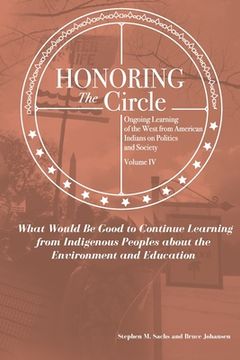Honoring the Circle: Ongoing Learning from American Indians on Politics and Society, Volume IV: What Would Be Good to Continue Learning fro (en Inglés)
Reseña del libro "Honoring the Circle: Ongoing Learning from American Indians on Politics and Society, Volume IV: What Would Be Good to Continue Learning fro (en Inglés)"
Honoring the Circle: Ongoing Learning from American Indians on Politics and Society, Volume IV: What Would Be Good to Continue Learning from Indigenous Peoples about the Environment and Education opens showing the importance of making an Indigenous approach to the world's complex environmental crises. Narrowly focused Western science and culture have made great advances, enabling people to live longer and better. But failing to consider broad and long-term impacts of actions has brought the Earth to the threshold of environmental catastrophes. Human-influenced climate change is the most pressing, but pollution, overuse of resources and overpopulation are all involved.Indigenous decisionmakers would have avoided this crisis by noting that everything is part of an interrelated whole. Western culture and science, is moving in this direction, but needs to further integrate Native approaches, considering side effects of actions over time before acting. As situations change and the future is unpredictable, policy must be reviewed regularly. For example, new chemicals should not be approved for use before extensive investigation of their safety, with ongoing research on the effects of their use for updating their regulation.Western culture and science, have underestimated differences in locations and people, assuming that what works well for one will work for another. A farmer in Brazil, who purchased a harvester that functioned perfectly in Iowa almost lost his crop when it would not work on his Brazilian farm. Studies of the efficacy of a drug in one demographic segment often do not indicate its efficacy or side effects in another group. The Native notion of difference of place needs more attention.Understanding diversity also needs to be applied in education, adjusting for different learning styles and rates of individuals and cultures. U.S. education has often functioned poorly, but schools at all levels have done very well by taking an Indigenous approach, seeing education as providing guidance and protection in facilitating unique creative whole individuals' learning who they are, as responsible community members, through participating in a variety of positive experiences. The private coed Putney School, an example of Indian-influenced John Dewey's progressive education, is strong on academics, especially in the arts. It involves students in problem-solving and seeing all sides of issues in small classes with numerous individual projects. Students have many leadership opportunities, including serving with faculty and staff on the community council and school committees. They discuss community issues in assemblies and participate in running the school and its farm through work that may include tasks in community service organizations. With concern for the environment, Putney also offers experience in nature.East Harlem public schools, in one of the poorest communities in the U.S., went from the lowest to the highest educational achievement ratings for many years by moving to a variety of small programs for students with different needs. Cross-culturally, Nueva Escuela schools in rural Colombia, based on research on what works, with student team research and community involvement, outperformed urban schools. In higher education, students excelled when engaged with the subject matter in dialogue, simulation, guided imagination and community involvement.In conclusion, the four volumes of Honoring the Circle show the extensive ongoing learning of the West from Indians and the increasing advantage of living according to Indigenous values, as doing so comes more to the fore, as exemplified by the U.S. progressive movement, accompanied by an increase in Native voices, with a surge in Indians elected to office.

